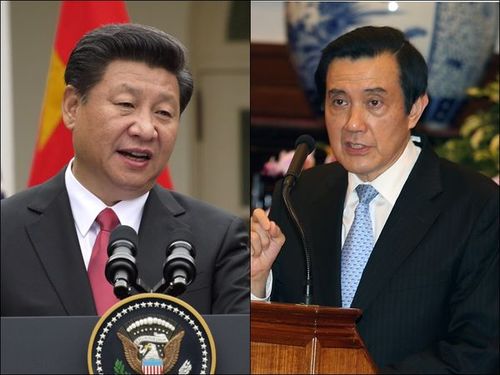1. This is not really about the 2016 elections in Taiwan. A lot of observers have suggested this is an attempt by President Ma and the KMT to influence the upcoming elections. I don’t think it is. The KMT is likely to lose the presidential election no matter what they do, in part because Ma Ying-jeou is a very unpopular incumbent. For the party to have a chance, the new KMT nominee Eric Chu needs to distance himself from Ma as much as possible. Ma’s meeting with Xi will knock Eric Chu off the front pages for a week and remind everyone that Ma Ying-jeou is still the president. I don’t see how that’s helpful to the KMT’s election chances.
2. This is a good thing for Taiwan's next leader. There's speculation that the meeting instead will serve to lock in the improvements in the cross-Strait relationship that have accrued under Ma, and somehow constrain Tsai Ing-wen's room to maneuver. Maybe, but I don't see how this will really harm a DPP president. Beijing is setting a precedent here for future meetings with whoever the directly elected leader of Taiwan is--note that Ma is meeting Xi as "Taiwan leader," not the chair of the KMT (a role he no longer holds), and the special emphasis on meeting as equals, right down to calling each other "Mr." and splitting the bill for the meal! That's a principle that adds to the legitimacy of the office of President of the Republic of China on Taiwan, and in turn makes it harder for Beijing to sustain the claim that a non-KMT president is illegitimate and that direct engagement is therefore inappropriate.
3. This is less about Ma, and more about Xi. These kinds of events are often the result of years of diplomatic maneuvering. A meeting with Xi Jinping has been a goal of the Ma administration for several years. It would be a symbolically powerful capstone to his legacy of improving Taiwan’s ties with the PRC. In fact, it could have happened over a year ago at the 2014 APEC meeting in Beijing. From what I can tell, it didn’t because leaders in Beijing rejected the idea. For it to happen now suggests that something has changed on the PRC side of the relationship, not the Taiwan side.
4. This is part of a larger diplomatic initiative by Xi. It’s useful to place this action by Beijing in a larger context. Xi Jinping recently completed a successful visit to the UK, and just last week premier Li Keqiang attended an important trilateral meeting with the leaders of South Korea and Japan in Seoul. Beijing also recently received a delegation from the Vatican. So the meeting with Ma fits into a larger pattern recent of conciliatory gestures by the Xi foreign policy team toward major players in the region and beyond. Again, it’s not as much about Ma as about what’s going on in Beijing.
5. The meeting will probably be long on symbolism, short on substance. The historical symbolism is striking, but the meeting is unlikely to have significant practical consequences. President Ma is not in a position to offer any meaningful concessions, and cannot credibly commit to any deals that might be struck, since he’d have to get them approved by the legislature, and he’ll be out of office in just a few months. The more important steps have already been taken: the leaders of the official agencies of the two sides—the Mainland Affairs Council in Taiwan, the Taiwan Affairs Office in Beijing--have already met in person before, and they communicate regularly. Under Ma, Beijing and Taipei have signed over 20 agreements to institutionalize aspects cross-Strait interactions. The fact that ordinary Taiwanese can get on a commercial flight in downtown Taipei and be in Shanghai in two hours is far more consequential than anything that is likely to come out of the meeting on November 7.

 RSS Feed
RSS Feed
